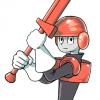For me, most of my "game design" goes on in my head, typically while I'm just going about my day (I tend to be relatively busy). If I think of something particularly useful, I jot it down in the Notes app on my iPhone. When I do get a chance to just work on it, I whip out my laptop, throw up Vim (my preferred note-taking software), and start fleshing out my ideas. I'll generally listen to music as I go (either electric/instrumental or in a foreign language, anything so long as I can't understand any lyrics that would distract me). Frequently, as I type things out, I'll reach a brief stopping point where I need to actually flesh out an idea rather than jot it down. At this point, I'll get up out of my seat and start pacing. And I'll pace and pace until I've fully and completely fleshed out the idea. Or until I'm interrupted. And this can potentially go on for hours. Sometimes I run out of time and have to postpone my thinking until later, so I'll jot down a quick summary of how far I got and write down the things left that I still needed to consider.
Generally this all goes on for several weeks / months before I feel that I've got enough material to start working on a project "for real".Then I go to town in Unreal 4, programming something. Granted, I myself am only 23 and graduated college back in May, so I only have 1 "real" game that I worked on for 4 months consecutively with a team (everything else was school projects or game jams of 2 weeks or less, pure prototypes). But I've had about 5 games that I've come up with over the years that I feel are of sufficient enough quality to devote any actual time to and the first of those constitutes my current project, codenamed Spectral. You can look it up on cartrdge.
Part of my "process" is considering not just the gameplay potential of the game idea, but also the marketability of it. If I can't think of way that a game of "this sort" would have a concrete place in the marketplace, both in terms of an existing player base and the current trends in the industry, then I don't really see a reason to continue devoting time to working on its design, let alone programming anything with it.
Not sure what you mean about your "solid concept improvement" question. When I feel that an idea is lacking, I'll usually notice either during my original thought process or during the prototyping stage. In those cases, I can usually see what it is the player is wanting to be able to do (occasionally by getting random friends/relatives/associates to do a quick playtest), see HOW the current design is failing to properly achieve that, and then understand what things need to be fixed to achieve that. Then it's just a matter of brainstorming / prototyping different features to see if they are a good fit for creating the feeling in the player that I am seeking. A nice combination of intuitiveness, autonomy, and functionality.
I don't "go back to the drawing board" as often as some of the other students I've worked with before since I tend to spend a lot more time developing designs and code that emphasize robustness, so my stuff will generally "work" longer than my cohorts' before my team and I come to see the weaknesses in it. I'm actually currently on my 3rd iteration of a robust skill system (first on a project as a Junior, then again on a project as a Senior, and then now). Each time, I've come to recognize key problems in the previous versions and have begun making alterations to the design. It also helps that I've grown in general as a programmer with each year.











